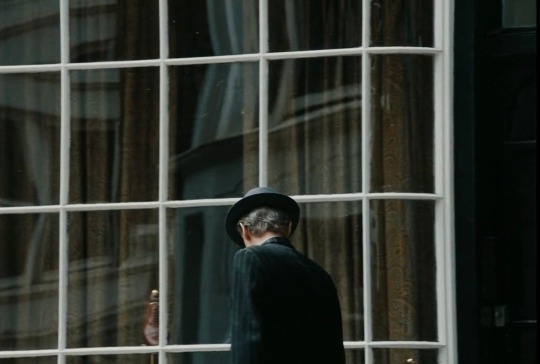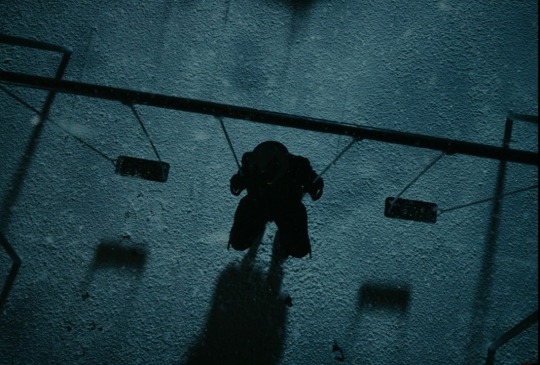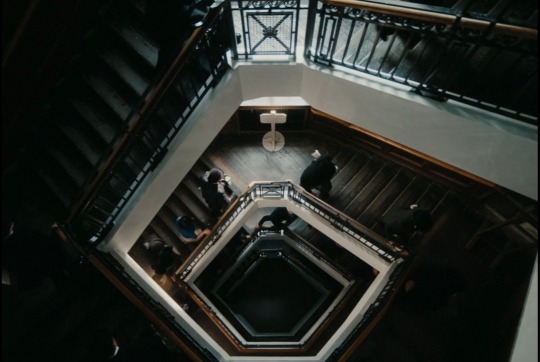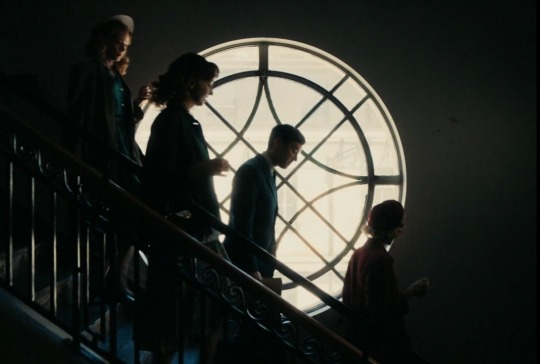#dp: jamie ramsay
Text









Living (2022) dir. Oliver Hermanus
#living#oliver hermanus#bill nighy#aimee lou wood#alex sharp#dp: jamie ramsay#film stills#films#:')#that fifth still...#living 2022#kazuo ishiguro#fyc: bill nighy!!!!!!
139 notes
·
View notes
Text
'For All of Us Strangers—Andrew Haigh’s second film about lonely gays in high-rises—the director tells George Fenwick about urban isolation, what queer people share between generations, and how to write a good sex scene.
When Adam (Andrew Scott) first sees Harry (Paul Mescal) in Andrew Haigh’s All of Us Strangers, he’s a literal beacon of light: a lone figure staring out from the darkness of the near-empty apartment building in which they both live. Adam, a screenwriter, lives a solitary life of writing, eating takeout and watching home renovation shows, but when Harry appears at his door with a bottle of whiskey, a cautious romance begins between these two lonely souls, adrift in the sprawl of London.
Loneliness has long been a fascination of Haigh’s—specifically, since 2011, lonely gays in tower blocks. Scott and Mescal perform isolation with painful precision, and I tell them this on a call to collect their four favorites, before I connect with their director for a longer conversation. Both actors demur, redirecting their praise towards Haigh and Jamie D. Ramsay, his director of photography. Ramsay shot Oliver Hermanus’s Moffie and Living, which also feature grappling, secluded protagonists reaching out for connection with gentle, dreamlike textures. “Playing loneliness, as much as you want to think about it, you’re actually really reliant on the DP,” Scott tells me. “In a very subtle way, it’s allowing the audience to just see a person in a room. The visual picture is very important.”
Haigh’s script, adapted from Taichi Yamada’s 1987 novel Strangers, also sends Adam into his past; while writing about his upbringing, the character takes the train to the suburb he grew up in and finds his parents (played by Claire Foy and Jamie Bell) in his childhood home—filmed in Haigh’s own boyhood home—the same age as the day they died more than 30 years earlier. Adam’s loneliness is countered by an innate desire to connect; as he bonds with Harry over their respective isolation from their families, he is also suddenly able to speak truthfully about his sexuality to the ghosts of his parents.
It’s in these impossible conversations that Haigh’s script finds its greatest catharsis. “I find the scene on the bed so upsetting,” says Mescal, “where Harry tries to make light of [his loneliness]. He tries to describe it as an inevitable thing, and you see true love between Adam and Harry, because Adam doesn’t let Harry off the hook—not in an unkind way. He’s like, ‘Why do you think that that’s okay? It’s totally not.’ He invites a very difficult conversation. [Adam and Harry] both serve as warnings to how dangerous conversations can be in a family setting. Adam has the privilege to go back and reinvestigate that parental relationship, where Harry doesn’t have that opportunity.”
Haigh, grateful for his actors, dives deeper with us to explore how he set about analyzing the relationship between romantic and parental love through Adam’s journey, the strangeness of filming All of Us Strangers in his own childhood home, and the slippery allure of clubbing.
Gay men from slightly different generations share a lot in this film—could you talk about why that distance was important, and what unites them?
Andrew Haigh: I knew that I wanted them to be different generations. The whole film is about generations, and how we see the world, and how we love. I am really obsessed with what makes us different from each other, and also what makes us the same. It’s about what we share.
There is a younger generation of queer people that have had a very, very different experience than my generation, just like mine is different from the generation above. Sometimes you can get entrenched in what makes you individual, rather than seeing [that] we are sharing so much along the lines. Even though the world has changed so much, if you are any kind of outsider, you’re definitely not in the center of the mainstream. You’re on the edges of things, and it’s very easy to find yourself drifting further and further away. For some people, that’s fantastic, and they love being in that place. For other people, it can be very painful. Within queer life, sometimes that is drifting away from your family.
I love the way you depict urban isolation in the film. Why did you want to place Adam in this empty high-rise, and what does it say about 21st-century living?
Urban alienation and loneliness is a real thing. We often come to cities hoping it’s going to be the answer. Lots of us grew up in the suburbs, and then we come to the city because that’s where it’s at, and when you’re a queer person, that’s where you feel like you have to go. But when you get to the city, it can be a very isolating place. It’s not easy to meet people, to communicate, there’s people everywhere, and you can get locked into your world.
For me, this is a film about someone trying to escape loneliness. I wanted, in the beginning of the film, to really sense in every frame his aloneness in the world and his need to reach out: he’s looking out at London through the windows, he’s going on the train back to his parents’, he’s always reaching out for something. That can be a difficult thing when you live in a city. You can get trapped.
How long did it take to find the perfect high-rise?
It was a nightmare. The inside is actually a set. Very few apartment blocks would let us film in them, and most wouldn’t even let us photograph the outside of them, because they’re all run by huge multinational corporations. I knew I wanted it to be a part of London that is sort of new, so we tried to shoot in Vauxhall for a while, where all these new buildings have gone up. But no one would let us film, so this is in Stratford [a suburb of east London]. I like that, because it feels like it’s on the edge of something. It’s trying to be a new community, but it’s not quite bedded in yet to the surrounding world of that area. It was kind of perfect in the end: there is London, the city itself, somewhere out there on the horizon.
I went to the Westfield in Stratford to get my outfit for the BIFAs, and it does feel like the end of the world.
That Westfield center, I mean, oh, my god. If we’re going to get to the end of the world, it’s that.
The way you shot the building reminded me of the monolith in 2001: A Space Odyssey—the way it felt not human, and unknowable.
It’s so grand and ugly, and you feel like it’s never going to move. It’s a really unpleasant building—I mean, I’d never live there, but for people that live there, I apologize. I’m sure it’s very nice if you live there for real.
You filmed Adam’s family scenes in your own childhood home. When did you decide that would be your location? How did it then feel once you were actually standing on set with the actors in it?
As I was writing, it just kept coming into my mind. I was trying to write about someone going back home, so, of course, when I’m writing, I’m so in my own head, and all I could imagine was the memories of that place where I used to live. I left there when I was eight, and I’ve never been back before the film. As we were thinking of locations, I was like, ‘Why don’t I just go there?’
I quite foolishly thought it’d be fun, but then being there was a strange experience. It felt like it was haunted somehow, which is perfect for the film. But it was haunted by my memories of being there. It’s very strange how 45 years can go by, and you can still remember everything. I could remember what the banister felt like, I could remember what the doors were like, I could just picture everything once I got in there.
I think it helped the film enormously. Because [everybody] knew it was my house, they felt like they could be more open about their own memories of childhood. So much of it, when we were there, was us all sharing stories of when we were young, and that created a magical tone, not just from me and the actors but the crew as well. When you’re trying to capture something special on screen, it’s not just about what’s on the camera—it’s everything around it. It’s the tone of the set that you create. It’s the conversations you have with everybody that can help that appear on screen.
That’s clear in the scene when Adam comes out to his mother, which is so beautifully done. It has this humor to it—for queer viewers, a lot of the clumsy things that Claire Foy’s character is saying are so familiar.
It took me a long time to write [the scene], and we were all quite nervous shooting it. I’m trying to do lots of different things. I don’t want to vilify the mother necessarily in this; she’s a product of her time. She clearly loves her son, she just doesn’t understand. The idea of her son has suddenly shifted. Also, you’re telling a story about an adult who’s got over all of this, you hope, and suddenly he’s been dragged back to exactly how he used to feel in the ’80s, when all of those things that the mother says are exactly what everybody said to us all of the time. It’s almost like the emotion builds up in Adam without him even knowing it’s building up.
I like the idea that the humor comes in at the beginning, and you’re like, ‘Oh, this is so funny, and I can’t believe they say that,’ until you realize, oh, yeah, that is what people said, and it’s actually affecting Adam. I’ve been very intrigued, as some people stop laughing earlier than other people in that scene. That’s interesting, because there’s a moment when you don’t laugh anymore in that scene, and you’re like, ‘Oh, no, this is painful for Adam.’ But I quite like what that makes the audience feel, because somehow they’ve become like an accomplice in it. For a lot of people, that must be like, ‘Oh, yeah, that is also how we used to speak, and how we used to feel.’
Let’s talk about sex. The way you portray sex throughout your work is so brilliant—it’s real and tender, and 45 Years is one of the few films I can think of that allows older people a sex life on screen. Could you talk about why sex is important to you as a writer, and why those scenes are important for your characters?
It’s just what you said—it’s important for the characters. I’ve always tried to think, if I’m going to do a sex scene, what is it saying? What are we showing about the character? In 45 Years, it’s a scene when they almost reconnect in a very important moment in the film, and they can’t have sex, they don’t have sex in that moment. It doesn’t really work, and it has ramifications going forward. So it’s a fundamentally important scene.
It’s the same in [All of Us Strangers]. It’s about two people understanding what the other person needs in that moment. It’s really tender, intimate, and sexy—all of the things you want sex to be. It means something. They’re also having fun, and that’s really important for this moment in the movie. I know there are people now that feel like we don’t need sex scenes in film anymore. What I think people mean is—not to put words in their mouths—they don’t want sex scenes that don’t have any other purpose other than showing sex. There’s no reason for that. But lots of us do have sex, lots of us want to have sex as part of our emotional lives.
I have to read you a review from our Letterboxd community. Kristen writes, “You can’t have a Blur’s ‘Death of a Party’ needle drop followed by Pet Shop Boys’ ‘Always on My Mind’ and not expect me to cry.” How does music inform your writing and direction?
With this one, hugely. It’s almost like a musical to me, this film. At one point, Claire’s character is even singing along to a Pet Shop Boys song. All of these songs were very, very integral, [and] most of them are there in the script stage. They’re chosen to have an emotional effect, and to comment on what’s happening: ‘Death of a Party’, for example, is a strange song to have in a club during that scene, but I remember being in that club back in the ’90s, and they did play it. But it somehow speaks to what’s happening in the film—this euphoria, but also a darkness that is overlapping.
The Pet Shop Boys song was very much in there from the [start]. I love this idea that a romantic ballad can also act as an apology from a mother to a son. I think that song weirdly defines that thing I’m trying to say, which is that parental love and romantic love are so wrapped up together. Our understanding of what we want romantically comes from how we experience love in a familial setting.
I want to talk about the club scene—in a lot of films this year, club scenes have provided such pivotal moments for characters. Can you talk about why you wanted to send your characters to an iconic queer venue, the Royal Vauxhall Tavern in London, and why that was an important turning point for Adam’s story?
If you look at my own queer life, when I started feeling comfortable about things, I was going out clubbing a lot. In some weird sense, because time is very slippery in this film, their decision to go clubbing, which comes directly after Adam having that conversation with his dad, made sense to me. But the thing about clubbing and going out a lot, it is both incredibly euphoric—you’re in a collective place with other people like you—and there can be an edge to it that you can slip off. You can lose your moorings a little bit.
Queer clubbing is so fundamental to that community, and has been for a very, very long time, so I wanted to make sure there was a scene that felt like it was talking about both the highs and lows of what that can be. Plus, it’s a way for me—I don’t go out that much anymore—to go back and remember how I used to feel when I was out in those places.
You’ll have to have a UK opening party at the RVT.
That’s what I thought! It’s definitely where there should be [one]—I spent a lot of the late ’90s in that place.'
#Andrew Haigh#All of Us Strangers#Always on My Mind#Pet Shop Boys#Andrew Scott#Claire Foy#Paul Mescal#Jamie D. Ramsay#Taichi Yamada#Strangers#Moffie#Living#Jamie Bell#45 Years#Blur#Death of a Party#Royal Vauxhall Tavern
3 notes
·
View notes
Text
"Thanks very much. Hi everybody. Thank you to the London Critics' Circle for this; your work is as important as - my love of film is the same love that you have and I appreciate this award; it means a lot. I love acting and I love actors even more, so this award is a reflection on the people I've had the privilege of working with over the last couple of years - Emily Watson in God's Creatures, queen Saoirse Ronan in Foe and the wonderful man over there, Andrew Scott. I feel like he's - to act is to collaborate and I've had the best dance partners that anyone could have ever offered me so this is a testament to all of you. But I want to say a particular thank you to Andrew Scott and Andrew Haigh for All of Us Strangers; it's a film that absolutely changed my life, and how Searchlight and Blueprint have looked after that film is so important to me because films like this need to be seen, and the space for films like All of Us Strangers is becoming smaller and smaller so - I know I'm preaching to the choir here - but we are the reason films like this are, are continuing to exist, so I thank you so much for directing this and writing it with such grace. Andrew Scott - you've changed my life; you're an incredibly diligent and kind human being and this has been one of the privileges of my life, so thank you very much."
"Uh, thank you so much for this. It's been a kind of crazy few months I think for all of us, and this really does mean a lot to us. Obviously film-making is collective, so I want to thank these people here; wonderful actors. Andrew, Paul, Jamie and Claire they can't be here, all the incredible crew, Searchlight and Film4 who - sitting there - thank you for treating us so nicely. I do want to also just thank a lot of people in this room tonight; a lot of the critics, a lot of the writers. You really have been so generous with the film, and you have talked about it in really beautiful, meaningful ways, and you have connected it - connected to it - in really personal ways sometimes, and that means so much I think to all of us, so thank you to all of you lot out there too, and thank you very much - cheers."
"Thank you so, thank you so, so much - can you hear me? This is completely wonderful, thank you. Uh, I want to say thank you to the London Critics' Circle for the beautiful way you spoke about our, our film; it really helps a film like ours and it just launched our film in the most extraordinary way and, and it's, and it's made a difference. You know, people are coming to see our film, um, and I, you know, I - I think it's important to say that for a film with a, a gay love story at the centre of it being number one in Ireland at the box office and number at some point I believe this week in the UK - it's not nothing. Don't say those films don't make money. But um, I'd really like, I'd really like to thank Graham and Sarah at Blueprint and Film4 and uh, Searchlight for their continued support of our film. Um, our amazing cast and crew, um Jamie Ramsay I want to say, our, our incredible DP was just amazing, Kahleen Crawford for assembling our little tiny cast. Um, I want to thank, um, Claire Foy and Jamie Bell who are just forces of nature - my sexy mum and dad - and uh, you're also sexy Paul Mescal. Uh, uh, look - I couldn't have asked for a more collegiate, loving, intelligent, hard-working, brilliantly talented person to work with; I love you Paul - thank you so much for being on this uh, great adventure with me. Um, and Andrew Haigh - you know the film's been out for a little while and I have never, never in my life had such uh, heartfelt, uh, uh, raw responses from audiences who, who see this film. Uh, it's really just so beautiful to, to witness now that the film is actually out um, in, in the world, and it's down to Andrew's, um, real bravery you know, because I love that expression 'Take your broken heart and turn it into art' - and that's exactly what you've done. And he conducts the set with such kindness and compassion and fun, you know; I thought that Andrew would be very serious person, but he's not. He's, he, he, he - he contains all the things, and thank you for trusting me with this amazing character. And just briefly, I want to thank my team; Lindy King and Ben Dey and everyone at Relevant, and my family - particularly my, my own, um, my own mum and dad who I thought about every day, so thank you, have a great evening."
#London Critics' Circle Film Awards#Paul Mescal#Andrew Scott#Claire Foy#Jamie Bell#Andrew Haigh#Foe#God's Creatures#All of Us Strangers
0 notes